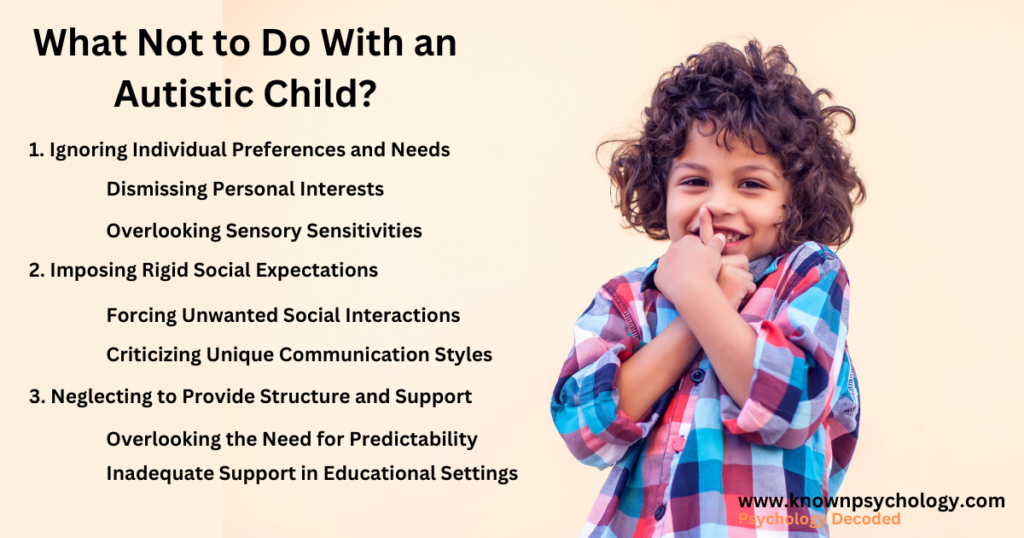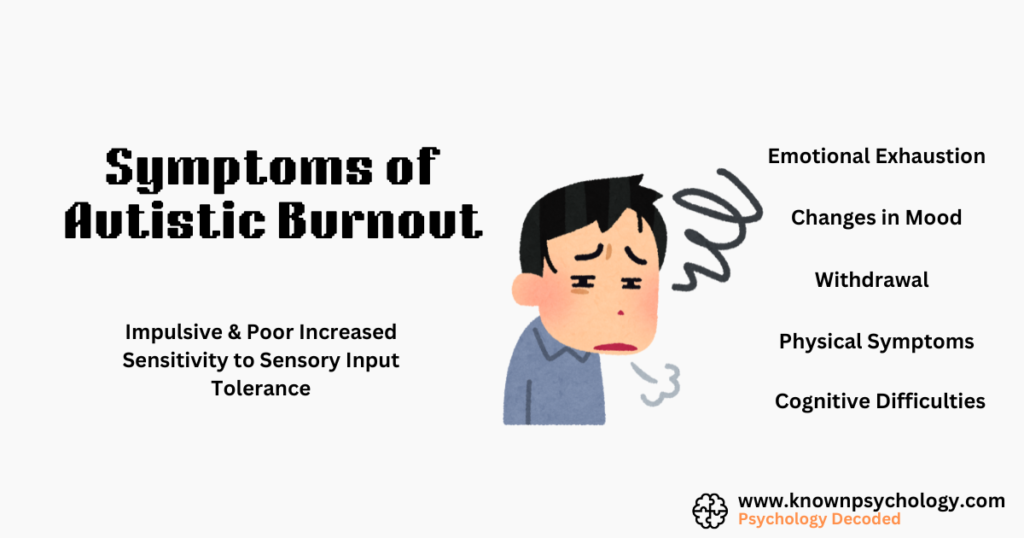
When raising or interacting with an autistic child, it’s essential to focus not only on supportive actions but also on avoiding certain behaviors and approaches that can be detrimental. These strategies also reduce the chance of autistic burnout This blog aims to provide insight into what not to do when caring for or engaging with an autistic child, helping parents, caregivers, educators, and others to foster a more supportive and understanding environment.
1. Ignoring Individual Preferences and Needs
Dismissing Personal Interests
Autistic children, like all children, have unique interests and passions that can be highly specific. It’s important not to dismiss these interests as mere obsessions or trivialities. Engaging with an autistic child through their interests can provide valuable learning opportunities and can be used to teach new skills. Disregarding what they love can lead to feelings of isolation and misunderstanding.
Overlooking Sensory Sensitivities
One of the most impactful mistakes is ignoring the sensory sensitivities that many autistic children experience. These sensitivities can include aversions to certain sounds, lights, textures, or smells. It’s crucial to recognize and accommodate these sensitivities rather than forcing the child to adapt to uncomfortable environments, which can cause distress and overwhelm.
2. Imposing Rigid Social Expectations
Forcing Unwanted Social Interactions
Expecting an autistic child to participate in social interactions in the same way as neurotypical children can be counterproductive. While social skills are important, it’s vital to respect the child’s pace and comfort levels. Pushing them into overwhelming social situations can lead to anxiety and withdrawal, rather than fostering genuine social skills.
Criticizing Unique Communication Styles
Autistic children may communicate differently, using fewer words, different types of language patterns, or non-verbal methods like gestures or picture exchange systems. Criticizing or attempting to overly correct their natural style of communication can undermine their confidence and willingness to express themselves. Acceptance and encouragement in communication are key.
3. Neglecting to Provide Structure and Support
Overlooking the Need for Predictability
A common mistake is not providing a predictable structure that helps an autistic child feel secure. A consistent routine and clear expectations can reduce anxiety and help manage daily living. Changes should be introduced gradually and with ample preparation, rather than expecting the child to adapt quickly to new situations.
Inadequate Support in Educational Settings
In educational environments, it’s essential not to overlook the need for tailored educational plans that accommodate an autistic child’s unique learning style. This includes appropriate modifications, support, and resources to help them succeed academically while feeling supported and understood.
A note from Known_Psychology
When interacting with an autistic child, it is crucial to avoid actions and behaviors that can lead to misunderstanding, distress, or isolation. By focusing on understanding and respecting their unique needs and preferences, caregivers can create a supportive environment that encourages growth and development. Remember, every child is different, and taking the time to understand what works best for an autistic child is key to their wellbeing and happiness.
Mariam holds an MS in Sociology with a specialization in Medical Sociology and Social Psychology. With a strong academic background and extensive research work in both fields, she brings depth and clarity to complex topics. Her writing explores the intersection of society, health, and the human mind, making academic ideas easy to grasp and relevant to everyday life.



There are some fascinating closing dates in this article however I don’t know if I see all of them middle to heart. There is some validity however I’ll take hold opinion till I look into it further. Good article , thanks and we want more! Added to FeedBurner as properly
I think this is among the most significant information for me. And i am glad reading your article. But wanna remark on few general things, The website style is great, the articles is really nice : D. Good job, cheers
I will immediately take hold of your rss as I can’t to find your e-mail subscription link or e-newsletter service. Do you have any? Please let me know so that I may just subscribe. Thanks.
Hi, I think your site might be having browser compatibility issues. When I look at your website in Safari, it looks fine but when opening in Internet Explorer, it has some overlapping. I just wanted to give you a quick heads up! Other then that, fantastic blog!
Excellent beat ! I would like to apprentice even as you amend your website, how can i subscribe for a weblog web site? The account helped me a applicable deal. I were tiny bit familiar of this your broadcast provided bright transparent concept
I precisely desired to appreciate you yet again. I am not sure what I would’ve done in the absence of these tactics documented by you regarding such a area of interest. Previously it was a real distressing setting in my circumstances, but viewing this skilled style you managed it forced me to cry for fulfillment. Now i am grateful for the advice and then expect you are aware of a great job you are always accomplishing training other individuals through the use of your web blog. I am certain you haven’t come across any of us.